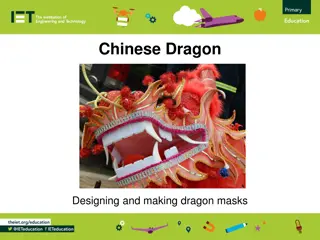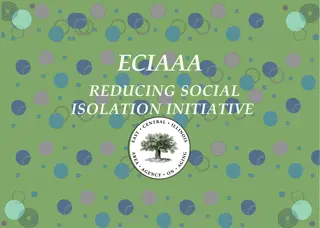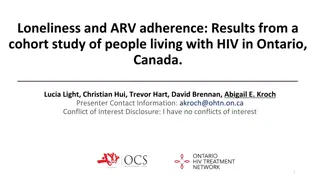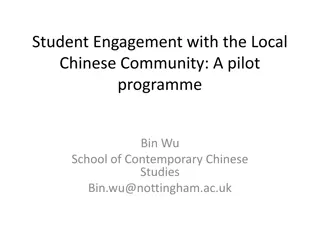Exploring Loneliness Among Chinese International Students Through Images
This study conducted at the University of Strathclyde aims to understand the experiences of Chinese International Students (CIS) regarding loneliness, a feeling heightened by cultural disparities. Through in-depth interviews and visual aids like images, the study delves into the unique perspectives and challenges faced by CIS in the UK. The participants' demographics and geographic origins in China showcase the diversity within this group, shedding light on individual experiences. The findings aim to provide insights for better support and understanding of loneliness among international students.
Download Presentation

Please find below an Image/Link to download the presentation.
The content on the website is provided AS IS for your information and personal use only. It may not be sold, licensed, or shared on other websites without obtaining consent from the author. Download presentation by click this link. If you encounter any issues during the download, it is possible that the publisher has removed the file from their server.
E N D
Presentation Transcript
Using Images to Explore Chinese International Students Understanding and Experiences of Loneliness SMARTEN FUNDED: End date 31st October University of Strathclyde
Introduction In the 2020-2021 academic year,157,065 Chinese International Students (CIS) enrolled in universities throughout the UK, making up 26% of the international student (INTL) population (HESA, 2021). Although research suggests CIS are at higher risk of suffering from the adverse effects of the cultural disparities which exist between their home and host culture, limited research has focused on understanding what loneliness means to CIS and how they experience this feeling. In this study, we conducted 15 in-depth, semi-structured interviews with CIS to explore how they experience and understand loneliness. Participants were invited to share their thoughts and experiences using images (their own drawings/photos, magazine images, online images, etc.), to enhance communication and overcome the language barrier.
Date Collection Participants received a 20 voucher after completing the interviews followed by a 30 voucher after the focus group Interviews Yvonne Chin-Van Chau (Student RA) No Interviewed: 4 M = 70mins Attended = 11 1. Conducted in English and Chinese 2. Participants were also emailed slides and folders of guided practices to refer back to the information. Jifan Ren (Student Co-researcher) No Interviewed: 5 M = 38 mins Helin Zhao (Student Co-researcher) No Interviewed: 3 M = 51 mins 4 = Alternative Materials These Included: 1. PP Slides from Workshop 2. Recording from MBCT Workshop 3. Folder of MBCT guided practices and exercises 4. Offered 1-to-1 short Q&A session with Dr Xi Liu Zhun Tang (Student Co-researcher) No Interviewed: 3 M = 46 mins MBCT Workshop All participants were encouraged to engage with at least 1 activity from the guided practice folder to provide them with a better understanding of MBCT prior to attending the focus group the following week. Participated = 14 Unavailable = 1 Helen & Yvonne Duration = 115mins Group 1: 5 people Group 2: 4 people Zhun & Yvonne Duration = 95mins Group 3: 5 people Jifan Duration = 80mins Focus Group
Overview of Participant demographics ID Age Gender Ethnic Group University Level of Study Duration in UK 30 Male Han Strathclyde UG 4th 4 years 1 22 Female Han Exeter Master 1 year 2 29 Male Han Strathclyde Master 9 months 3 27 Female Han Strathclyde Ph.D. 1.5 years 4 32 Female Han Strathclyde Ph.D. 4 years 5 22 Female Han UCL Master 1.5 years 6 28 Male Han Strathclyde Ph.D. 6 years 7 19 Male Han Imperial College London UG 2nd 1.5 years 8 22 Female Han Durham Ph.D. 5 years 9 32 Male Tujia Durham Ph.D. 3 months 10 29 Female Han University of Manchester Ph.D. 2 years 11 21 Female Han Durham UG 3rd 4 years 12 29 Female Han Strathclyde Ph.D. 2 years 13 34 Female Han Strathclyde Ph.D. 2 years 14 25 Male Han Strathclyde Ph.D. 9 months 15
Geographical Map of the Provinces in China The 15 dropped pins represent the cities/provinces our participants come from. This additional information allows us to illustrate the unique diversity of where our participants derive from, as opposed to using the general, blanket term students from China as they are often referred to in Research.
Example questions from interview schedule 1. How do people understand loneliness in Chinese culture? 2. How do you define loneliness? / What does loneliness mean to you? 3. How often do you feel lonely (since coming to UK)? 4. Factors contributing to loneliness? 5. How has loneliness affected your student life? 6. What do you do when you feel lonely? 7. How do you feel talking about your loneliness? 8. Questions exploring imagery
Data Analysis Braun and Clarke s reflexive thematic analysis (2019, 2006) Involving Student Co-researchers
Preliminary findings Theme 1: Lack of intimate, authentic and understanding social relationships Subtheme: Absence of close social circles and familiar culture Theme 2: Adaptation process and belongingness Subtheme: Disconnection from the academic community and working towards integration Subtheme: Challenges of intercultural communication Theme 3: Withholding feelings and preference for self-reliant, problem- focused coping Subtheme: The limitations of culture and language barriers in support services Subtheme: Avoidance or self-care? Subtheme: Acceptance, transition and reaching out.
Theme 1: Lack of intimate, authentic and understanding social relationships Extract from Transcript describing imagery: This is because I m from the South part of China. I never saw snow, well I did, but I never really experienced snow before I came to this country. That day [] I was quite upset and then, then I saw the snow and I was so happy, and I come out to build a snowman. And then I realized, okay, there s no one I can share this picture with, and actually, I was like a weirdo building this snowman alone outside and no one is really playing with me. That is quite sad. Although this snowman is having two arms like this *raises arms out wide* like being happy, but I think, I was happy when I was building this snowman. But maybe deep inside, I wasn t feeling that happy. Instead, I may be lonely at that time. And also, this snowman is made of snow, but it s already like, become ice *laugh*. I don t know what happened to him. That time, I was thinking, okay, this snowman is made of ice or snow. It s because of me, I made him have this shape. Then he has meaning. If I don t make him become a snowman, he will just be like the rest of the snow next to it So that is the same situation with people. If you don t really make people become your friends, if you don t give them meaning, then they will just be like every single stranger. Happy experiences and memories may be shrouded by the realisation that you are alone with no one to share these experiences. Moreover, the portrayal of happiness might not reflect the true feelings of loneliness within.
Theme 1: Lack of intimate, authentic and understanding social relationships Extract from Transcript describing imagery: I think when I feel lonely, I just feel like this person. Especially when I was in the UK for the first year of my PhD study. I both physically and mentally far away from my family, and I found that I was sad, and too lonely. And I think this flower, just stands for the beautiful outside world. But I just face this with my back. So that is the state at the time... Yes, they are promising. It's promising. It's beautiful, but it's none of my business [Asked about the link between their feeling of loneliness to picture] I face the work with my back. I feel like I have no relationship with everything outside the world . I have friends and I was quite busy actually. But I still feel lonely. Abrupt feelings of homesickness from moving away and the absence of familiar social circles can cause sadness and loneliness. The feeling of disconnection from your family may also translate into how you feel about the world around you. It can lead to the development of a negative disposition toward life, making you feel detached and unable to see any potential for positivity or happiness.
Theme 2: Adaptation process and belongingness Extract from Transcript describing imagery: I feel they are very busy, instead of caring [] During that time, the great loneliness was filling my heart, I was thinking that how can I stick the four years of PhD without my supervisors, others support? It means that I had to learn how to be a teacher, by myself. Or also, like my career, opportunity, and many others, and because my supervisor only told me their responsibility was to help me to finish my thesis [] like, you have to grow, develop a lot of skills by yourself during your PhD because after PhD, you should be qualified to lecture or other prediction working in university so I feel, how can I carry on this by myself? And then I think that was the most loneliness moment in my, in this two years. So during that time, I take a photo of this one. I felt that Oh, I will finish all of this by using this computer in this desk. Cultural differences regarding relationship with the supervisor, who prioritises academic support as opposed to serving as any other supportive figure in their life, rendering their relationship professional and cold. The feelings of loneliness then widen as they feel unsupported and disconnected from their academic community, creating more worry about the uncertainty of their future. [When participant shared with supervisor] she told me that we students, should, like empower ourselves instead of seeking help from them. So that was the first moment I realised there's a difference between teacher the relationship between teachers and students in these two national contexts.
Theme 3: Withholding feelings and preference for self- reliant, problem-focused coping Extract from Transcript describing imagery: It makes me feel quite strange as the book is guiding you to have fun things in some beautiful places in this planet but this book is called lonely planet. It's a contrast for me... You can see this in the middle of the picture, this is an earth, and also a men and an animal there. I thought that everybody is lonely in this Planet. As I mentioned before, which we seldom talk about our loneliness to family member of friends. But and it's, it's like kind of you know, denying you're lonely at first for me, but as family, I accepted such as that loneliness is a part of my stuff. So that's why I chose this photo because I think that light is everywhere out with people, you know, living in this planet and everyone will feel their own loneliness so that's why I think I can say the final we accept loneliness as part of myself so that's why I chose this photo because it is wonderful. As a family/ culture, loneliness is not openly discussed. The idea of hiding loneliness and not acknowledging or showing awareness of its existence may be considered as an act of denial of the feeling. However, changing this mentality of loneliness helps one to accept that this feeling is simply a part of life and exists in some form within everyone. (acceptance)
Thoughts about using imagery Overall agreement that imagery can be beneficial for helping students and people convey their feelings. - Improves expression of thoughts and feelings - Helps to illustrate feelings that cannot be described with words (abstract) - Bridges the limitation of language barriers - Should be used as an option should people feel forced to find the perfect picture .























